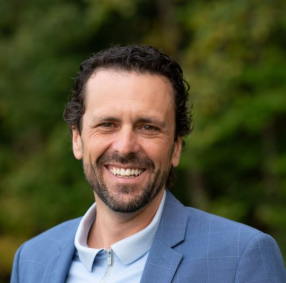Marc-André St-Yves
Master’s in knowledge mobilisation and transfer, 2022
Managing director and senior partner, Guérilla innovation
LEAD Research and innovation, Espace-inc
“Throughout my Master’s degree, and thanks to the path proposed by each of the committed and passionate professors, I have been able to acquire knowledge that has enabled me to develop new key skills for navigating the social interface of research and innovation. The knowledge transfer and mobilization programme is nothing less than a transformative framework for me.”
To spread good ideas around the world, to put people back at the heart of innovation, to break down the barriers between technological and social innovation... These aspirations are at the heart of Marc André St-Yves’ vision for Quebec’s growth. An expert in Quebec’s innovation ecosystem and a 2022 graduate of the Master’s programme in knowledge mobilisation and transfer at the Institut national de la recherche scientifique (INRS), he is convinced that, to change the world, knowing how to be is just as important as knowledge and know-how.
Innovation is at the heart of Marc-André St-Yves’ thinking and commitment. He wants to be one of the people helping to change the world. His background is eclectic. After studying food science and technology at Université Laval, he set up a cheese factory with 400 dairy ewes, then helped a large number of agri-food businesses with their research and development challenges.
With his firm Guérilla, he has been offering consultancy services to start-ups, SMEs and innovation zones since 2017. He was also director of innovation at the Réseau des centres collégiaux de transfert de technologie before leading the team that launched the Innovation Council with Quebec’s Chief Innovator, Luc Sirois, from 2020 to 2021. It was after completing a certification in innovation leadership at the Massachusetts Institute of Technology (MIT) that he undertook a master’s degree in research and public action practices at INRS’s Centre Urbanisation Culture Société, which became the Master’s degree in knowledge mobilisation and transfer, under the supervision of Professor Michel Trépanier, a specialist in university-industry relations.
“While the value of technological innovation is widely recognised, social innovation is still underestimated. Yet we won’t be able to modernise our industries by pitting these two aspects against each other. To create value, we need innovation at every level: economic, technological, social and environmental,” he asserts.
“While the value of technological innovation is widely recognised, social innovation is still underestimated. Yet we won’t be able to modernise our industries by pitting these two aspects against each other. To create value, we need innovation at every level: economic, technological, social and environmental,” he affirms.
In his view, a better interface between the research community and industry and the use of a common language are essential if we are to converge on mutually beneficial directions. He is stimulated by the idea of engaging in reflection in order to work together for the advancement of society. His studies in knowledge mobilisation and transfer at INRS have given him the tools he needs to do just that. “In particular, I honed my skills in terms of processes, analytical and critical approaches, and in mastering the fundamentals that help me to develop collaborative projects involving several stakeholders. Throughout my Master’s degree, and thanks to the path proposed by each of the committed and passionate professors, I have been able to acquire the knowledge that has enabled me to develop these new key skills and the ability to navigate this social interface of research and innovation. The BOM is nothing less than a transformative framework for me,” he says.
The links he has forged with his supervisor Michel Trépanier have led him to evolve rapidly: “I’ve learned so much that I now consider myself a sociologist of innovation,” he jokes. Whether he’s coordinating interactions with some thirty researchers in the Energy Transition Valley or working on a smaller-scale project, the key is the same: “You have to get to know each other better and translate the collaboration into added value for the two worlds you’re bringing together,” he maintains.
While he admits that you have to be “crazy enough to think you can change the world,” Marc-André has no specific career plan other than to “contaminate those around him and have a positive impact on them.” He wants to continue to help universities play their part in training the next generation of scientists. In his view, an experiential model such as that of INRS is relatively unique, and is an asset at a time when governments and businesses are seeking to boost regional innovation ecosystems through collaboration.
In this respect, he recommends that science students be open-minded and include more sociological points of view on the issues they are working on. “Finding our WHY is the only way to achieve breakthrough innovation and change the world,” he concludes.
[Interview conducted in July 2023.]

